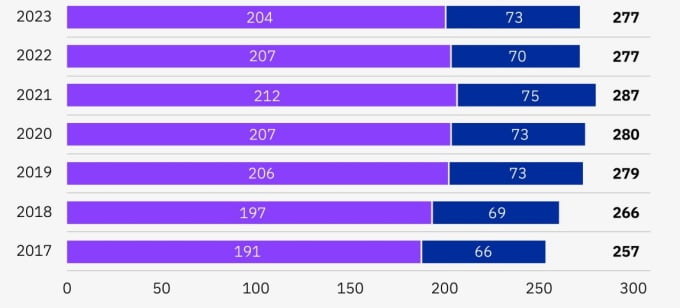
At the conference to answer questions about Decree 13 on the morning of November 23 in Hanoi, experts and managers assessed that data leaks in Vietnam have occurred quite frequently in recent times, in many different forms, in the context of strong digital transformation.
According to Lieutenant Colonel Nguyen Dinh Do Thi, Deputy Head of the Staff Department – Department of Cyber Security and High-Tech Crime Prevention (A05), there are three main causes leading to this situation, including awareness and consciousness of Users do not pay attention to personal data protection; The management of agencies and organizations is not adequate; Many technology companies silently exploit data using specialized software.
Meanwhile, Mr. Vu Ngoc Son, Technology Director of NCS Cyber Security Company, said that every month thousands of cyber attacks still occur on units in Vietnam, many of which are aimed at Stealing personal data in an increasingly valuable data context. Many businesses are attacked without knowing it.

Average time in days from when the data breach occurred until it was detected (light purple) and fixed (dark purple). Photo: IBM
Citing IBM’s statistics surveying more than 500 global businesses, Mr. Son said that with each such attack, organizations and businesses can take nearly a year to overcome and handle. Specifically, in 2023, it will take organizations an average of 204 days to detect a data leak, then an additional 73 days to handle the problem. The report also shows that with each leak, the damage to each business and organization in Southeast Asia, including Vietnam, is an average of 3.05 million USD, up from 2.87 million USD. last year.
According to Mr. Son, if a data leak occurs, businesses will not only suffer losses in reputation, economy, and internal data, but also face legal risks, after Decree 13 on Personal data protection takes effect from July 1.
Technically, Mr. Son believes that the above risks can be completely prevented. Analyzing typical attacks in Vietnam, this expert said hackers usually spend 95% of their time scanning and penetrating the system step by step, with only 5% being used to steal data and destroy data. ruin.
“So the chances of detecting and stopping attacks are very high,” he said.

Mr. Vu Ngoc Son, NSC Technology Director. Photo: VNS
However, the challenge for Vietnamese businesses is that the cost to equip monitoring solutions is still high, can be up to 2-3 billion VND per year, along with operating personnel, in the context of Vietnam’s shortage of human resources. information security. This is also the reason why Mr. Son’s unit has built a comprehensive set of NCSOC solutions to support businesses of different sizes to be equipped for monitoring.
“If network security is continuously monitored 24/7, businesses can detect early signs of system attacks, thereby completely preventing the possibility of data leaks,” he said. Son said.
Luu Quy

Leave a Reply
You must be logged in to post a comment.